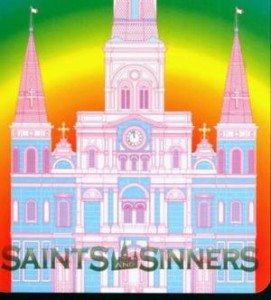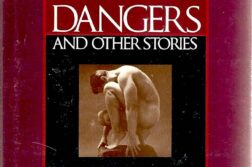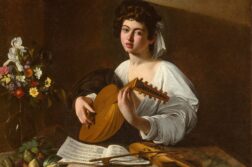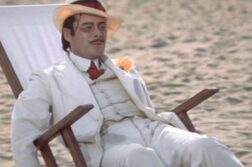IT’S EXHAUSTING being nice. I don’t even want to speak to the woman with neuropathy from Long Island that I sit beside on a bench outside the New Orleans airport on my way home from the literary festival Saints and Sinners, when she tells me she smells something burning. But, when I go over to the palm tree she points to, I see that someone has tossed a cigarette butt in the pot and started a fire in the mulch, which has eaten a hole in the plastic pot and continues to smoke even after my three attempts to put it out. “It’s a peat fire,” says the woman’s husband when he appears with a wheelchair. “In New Orleans.” It’s also the perfect surreal ending to four days at Saints and Sinners.
Saints and Sinners is a literary festival organized by some of the people who produce the much larger Tennessee Williams  Festival in New Orleans to bring together gay readers and writers—published and unpublished—for a weekend of panels, readings, and parties. Of course, what happens in the bars, restaurants, and private homes is as restorative to the beleaguered gay writer as the festival itself. My own extracurricular activities reflected the dichotomy of sex and religion peculiar to New Orleans.
Festival in New Orleans to bring together gay readers and writers—published and unpublished—for a weekend of panels, readings, and parties. Of course, what happens in the bars, restaurants, and private homes is as restorative to the beleaguered gay writer as the festival itself. My own extracurricular activities reflected the dichotomy of sex and religion peculiar to New Orleans.
There was a visit to The Phoenix, and my friend Bruce introducing me to the bartender with whom he was having a four-day affair, not to be compared with my own fixation on the forearms of a doorman at the Hotel Monteleone, with whom my romance consisted of an explanation of the airport shuttle. There was Sunday Mass in the cathedral in Jackson Square, where a soprano sang a passage from Mozart during Communion that brought tears to the eyes. There was the odd feeling in New Orleans that you are in both a big city with a great artistic tradition and some equatorial outpost; the strange resemblance of Canal Street with its trolley cars and date palms to Alexandria or Barcelona. There was the gunshot that writer Eric Andrews-Katz heard while on a trolley car in the Garden District, whereupon the passengers dove for the floor. (A teenage girl had been shot in the leg a few blocks away.) There was meeting Brenda Currin, the actress who was cast, while still a drama major at the University of Kansas, to play Nancy Clutter in the film of In Cold Blood, and her account of a night in a motel room with a vulnerable Truman Capote. There was finding writer Felice Picano lying on the couch of one of those little houses on Barracks Street that seem like mere living rooms off the sidewalk and the beginning of a progressive dinner party; and the perfect profile of Sergei Boissier as he spoke on a panel about the art of the memoir. There was beginning each day with a grapefruit on a bench in Jackson Square, and hearing the first trumpet note of the day in front of the cathedral that inaugurated the incredible music of the streets; and going to the houses where Faulkner wrote Soldiers’ Pay and Tennessee Williams A Streetcar Named Desire, and feeling a chill as we stood before the latter, so close to the magic that art occasionally achieves. There was walking past Christopher Rice on Royal Street as he photographed the back of the church where the statue of Christ is floodlit at night, casting a huge shadow on the façade—the same statue Tennessee Williams could see from his apartment on Toulouse Street.
New Orleans is Catholic, not Protestant, which is a big part of its sensuality, its love of art and theater. Everyone in the French Quarter is performing. My last night at dinner I listen to an Australian lesbian who teaches the history of music tell me she never remembers the names of her male students because they’re boys. Then the writer Tom Baker tells us a story about a Venezuelan dishwashing soap commercial he made when he was an ad-man, and its soap opera star who arrived three hours late, washed the dishes, and held up the plate to see her reflection, which was so distorted that they had to send to Miami for a better plate from Pottery Barn. Does any of this make sense? It does at Saints and Sinners. Earlier, someone had asked me if I’d known Eudora Welty, which made me feel very old. Walking home, Eric Andrews-Katz describes growing up in Gainesville, Florida, and being called “faggot” every day of his life since coming out at fifteen, and being left, in the class will, a case of AIDS.
The demographics of Saints and Sinners were not encouraging: too few young people. (Tennessee Williams could not have afforded this conference, I suppose—not the Williams who washed dishes in the restaurant below his apartment to pay the rent.) On a panel on gay journalism, I felt like a relic from the age of print; the other two panelists, Sean Syms, from Canada, and Diane Anderson-Minshall, whose book Queerly Beloved is about the gender transition of her husband Jacob, were involved with the Internet. On another panel on book reviewing—where Ed White revealed that a writer never forgets—Christopher Rice praised the Internet as the place where readers can find their own kind; though here at the festival, if it seems that the mainstream publishers may have abandoned gay literature, it’s the small presses that have picked up the slack.
But then, that’s what conferences like this are for. Among the master classes, readings, and parties, the generations and genders, cross pollination occurs. By the time I’m at the airport sitting beside the burning palm tree, I’m thinking of how Diane Wiest in Bullets Over Broadway put her hand on the young man’s lips and kept saying: “Don’t speak.” The downside of these gatherings is that we all know the writing has to be done alone. But you carry away from Saints and Sinners a warmth that comes from knowing other people are doing the same thing that you are. It’s exhausting being nice; but writing on your own is lonely, and so we have festivals.





